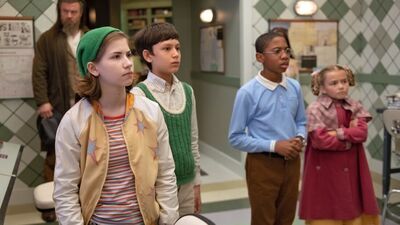Disney+’s The Mysterious Benedict Society Plays Tedious Mind Games

“The Mysterious Benedict Society” imagines a cloudy world not too different than our own, albeit with bright pastel clothes, 1960s technology, and two Tony Hales. It may look like a Wes Anderson movie (“The Grand Budapest Hotel” in particular), but the human beings inside this storybook are a loving reflection: they are divided, they’ve lost touch with truth, and they’re on the brink of a type of despair. This, admittedly, is an interesting world for a Disney+ series to take place, mixing style with an open-hearted, apolitical look at the current social temperature. Here, this problem is called “The Emergency,” and a brilliant narcoleptic named Benedict (Tony Hale) has hatched a plan that could save the world and solve the mystery behind the misery.
It’s up to a group of smart orphans to save the day, like the well-read Reynie (Mystic Inscho), the shy but knowledgeable Sticky (Seth B. Carr), the resourceful Kate (Emmy DeOliveira), and the sassy baby of the group, Constance (Marta Kessler). They are picked because of their creativity, their gumption, and a quality that Hale’s Benedict says with awe—their empathy. In different selection tests, the kids show how they see others, especially if that means sacrificing their spot in a race, or giving away half of their needed pencil. Their mission that will require them to infiltrate the L.I.V.E Institute, which seems built from chaotic rules (“you can go wherever you please, just stay on the path”), and is run by Dr. Curtain (the other Tony Hale, only seen toward the end of episode two). The intellect of these innocent kids, and how they use such smarts for others, is going to be their superpower.
For all that is intriguing about the show, “The Mysterious Benedict Society” struggles to gain a desired momentum with its game-filled storytelling. It becomes apparent how much the series loves a brain teaser, a puzzle, a loophole in a rule, a statement that can be interpreted in numerous ways. Some tests are given snazzy visual presentations, like when the screen splits into to watch contestants figure out how to cross a checkered room without touching any squares. The series loves words—it seems to love monologues that overstay their intrigue—and it loves putting young characters through tests that play more like crafty screenwriting than natural character development. But while watching Reynie go from one test to the next in director James Bobin’s pilot episode—albeit in settings shot with strict precision—initially sounds unique, it takes on the major drag of standardized testing itself. The first two episodes have a start-and-stop energy, with more tests leading to more tests, and it gets more and more tedious.

The young cast here is at least charming—the young four create memorable characters with their distinct facets, like how Kate loves calling herself “The Great” and solves many of her problems using the bucket. It’s endearing too to see Sticky navigate more physical challenges using his brain, like retracing every step of a maze. If the show is going to get better in the episodes that follow, I imagine that will be more from these characters getting a bit more space, or doing something more than just solving riddles.
As for the adults, they are given some space, but usually just add to the show’s weightless kookiness. Hale (who produced the show) enjoys the emotional fragility that share brain space with Benedict’s wild ideas, but the playful aspects of the performance don’t pop as much as you’d hope. Kristen Schaal’s Number Two assists Benedict, along with Rhonda (MaameYaa Boafo) who even was a test herself in a different way. Then there’s the muscle of the group, Milligan (Ryan Hurst), who plays the part of seeming imposing, until he opens his mouth and shares a bit more of his story. The adults aren’t very interesting, nor are the stakes that they nudge along. They sit on the sidelines by episode two, so to speak, but their presence already feels minor, despite all the time spent building up to meeting Benedict.
I am completely uncertain if this series will work for its target audience, especially as its rule-based fantasia comes right at the end of a school year. The show’s style has the potential to be immersive, but it underestimates how much a tight story can be essential, and overestimates how exciting it is for a story to stop in order to deal with the latest puzzle. “The Mysterious Benedict Society” is too slack even when it tries to stay busy, as it plays a game you don’t get sucked into, so much as bored with.
Two episodes screened for review. The first two episodes of “The Mysterious Benedict Society” premiere on Disney+ on June 25, with a new episode weekly.





